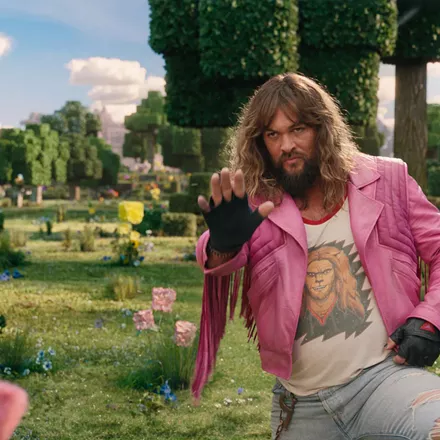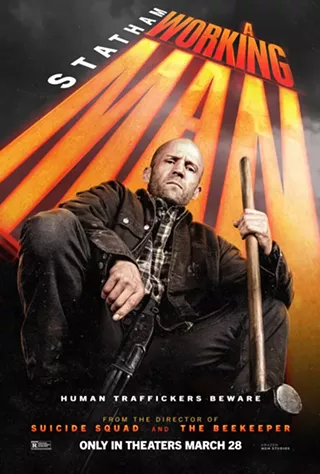As far as I know, no one had yet made a decent film of Herman Melville's Bartleby, the Scrivener. And Big Fan is a movie about a rabid football fan whose life revolves around phoning sports-radio call-in shows. I think you see where I'm going with this: Yes, Big Fan is the first successful adaptation of Bartleby, and it works by ignoring all of the particulars of the story and keeping only its most basic element: refusal.
Patton Oswalt stars as Paul Aufiero, a middle-age man who lives with his mother in a rotting house in Staten Island. One of Paul's brothers is a lawyer, the other a midlevel executive with a retail company. Not one to succumb to the base needs of capitalist impulse, Paul serves the public by sitting in a tiny booth in a parking garage and collecting money from motorists while listening to sports radio. He's a doughy, unattractive, compulsive masturbator who's never had a girlfriend, and he's very, very happy.
Well, he's happy whenever the New York Giants win a football game, and when he gets to call his favorite sports-radio show, and when he's with his friend and fellow Giants fanatic Sal (played by the underrated and awesome Kevin Corrigan). He's only unhappy, it seems, when he has to deal with his family.
That's because they're always offering him better jobs or blind dates or opportunities to make money, move out of his mother's house and get on with his life. And this is what makes Big Fan so strange and interesting: Paul isn't a loser dreaming of a better life. He isn't hoping for his big break, and there's no romance in the form of a plain girl who secretly loves him and will redeem him when he finally notices her. Paul simply, and clearly, wants nothing more than what he has: a tiny bedroom with an enormous poster of his favorite Giants player, a job that lets him listen to sports radio all day, and fall weekends tailgating at Giants Stadium.
Writer/director Robert D. Siegel, who wrote the screenplay for The Wrestler, films Paul's life perfectly, with lots of close-ups of Oswalt's pudgy face, rooms decorated in late-20th-century chintz, and an overall dirty, grimy and crowded feel. It all creates an atmosphere that should reek of desperation.
But desperation isn't the emotion that comes to the forefront in Oswalt's weird and complex performance. When Paul is sitting with his family and watching TV commercials for his brother's sleazy law business, or witnessing his siblings' lives, his face forms a pout so intense that it could kill a Mouseketeer. But when he's watching the Giants win a football game, he looks as happy as Rush Limbaugh in a room full of oxycodone and doughnuts.
Siegel's screenplay and directing work for a number of reasons. First, he avoids music in most scenes. This creates greater tension, with thick silences building up around Paul's pouty moments. But most importantly, the script doesn't pass judgment on Paul's weird little life. It's portrayed with a repulsive honesty, but Paul wants nothing more, and is content in his own way with what he has. When his brother offers him a better job, Paul notes that he already has a "career." When his mother tries to fix him up on a date, he makes it clear that he has no interest. Given every opportunity to better himself, he would simply prefer not to.
And that's because these aren't opportunities for betterment, at least not by his own standards. He's already found perfection in taking on the "tremendous responsibility," as he puts it, of "being the Giants' no. 1 fan."
There are a lot of films about middle-age losers, but they're almost always goofball comedies (Step Brothers, Big Daddy) or romantic comedies (Failure to Launch, The 40 Year Old Virgin), and the dénouement involves some kind of redemption. But that redemption is a rejection of the life they lived before. That's such an obvious trajectory, and so unsympathetic to the initial character, that it's time someone Bartleby'd it, and simply said, "I'd prefer not to."
Even though Paul isn't directed toward growing up, the film still has conflict and a strong, forward trajectory. Paul's radio call-in life puts him in a pissing match with Eagles fan Phillie Phil. And one day, Paul spots his football idol, Quantrell Bishop (which is probably the best fake football-player name ever), and follows him to a strip club in Manhattan.
There, things get out of control—not in a fun or growth-ful way, but in the way that things get out of control when over-amped superstars who've been groomed for their aggression and physical power encounter tiny, adoring fans. This plot contrivance lets Siegel play out all the angles on Paul's refusal to be anything but what he is, and leads to a tremendously effective ending.
Right now, Big Fan is easily one of the best, and most creative, films of the year. Its originality comes not from wild ideas or fantastic plot devices, but from exploring from the inside, and with sympathy, a form of life that has in the past only been subjected to ridicule and reform.
















